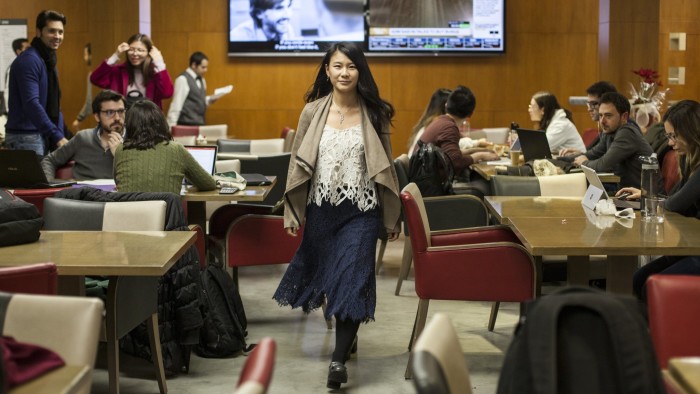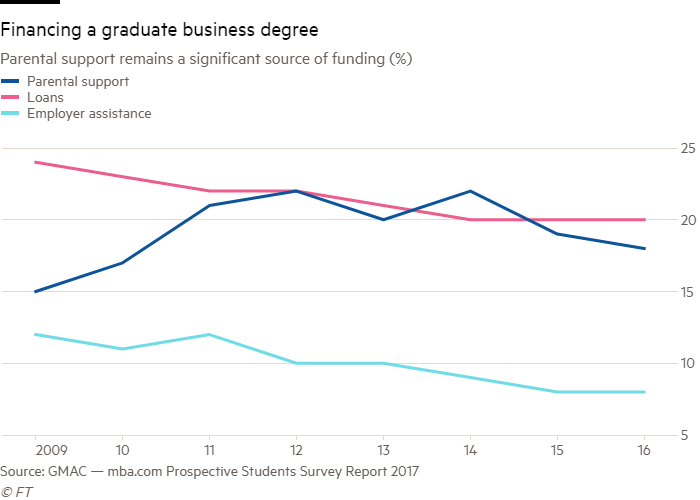The parents who pay for their child’s MBA

Simply sign up to the Business education myFT Digest -- delivered directly to your inbox.
Grace Baker is proud of her sons, who secured places on prestigious MBA courses at Harvard Business School and Stanford respectively. But Ms Baker, who asked for her name to be changed to save her boys’ blushes, helped them to get over the line in the applications process by paying $14,000 for an admissions consultant.
“This is an investment,” she says about the bill, noting that other parents in her circle of friends on Manhattan’s Upper East Side had gone further and paid their children’s MBA fees and living expenses. “Our zip code is very achievement oriented,” she says.
Part of the reason for paying for outside help was the desire to give her children some guidance, Ms Baker admits. Neither she nor her husband had attended business school so they had no personal experience to pass on. She also felt that her sons, who had demanding engineering jobs, needed a spur to complete a business school application. “I was the monkey on their back,” she says.
Parental involvement in children’s business school studies has been increasing. The proportion of financial support that business school students receive from parents climbed from 15 per cent in 2009 to a high of 22 per cent in 2014, according to the Graduate Management Admission Council. It has since slipped but was still up on pre-financial crisis levels, at 18 per cent, in GMAC’s latest survey published last year.
The extension of “helicopter parenting” into postgraduate studies has coincided with declines in loans to pay costs. A quarter of students took on such debts in 2009, but by 2016 this fell to a fifth, according to GMAC. Employer assistance also declined during this period, from about 12 per cent to 8 per cent.
Parental help to pay business school costs is highest among students from East and Southeast Asia, a third of whom receive support, according to GMAC. European students were not far behind with three in 10 receiving financial help from the bank of mum and dad.

Faith Xu is an only child from northern China, whose parents downsized from the family home and used some of the proceeds to fund the €88,000 tuition at Iese Business School, Barcelona.
“We are not a wealthy family and I had no savings,” Ms Xu explains.
The 27-year-old hopes that business school will advance her ambitions to build a career in the tech industry. After completing her undergraduate degree in Beijing, Ms Xu worked for a Munich-based start-up that sold baby products online, where she built the Chinese language operation into its biggest revenue generator. That company gave her business and leadership experience, but Ms Xu says she barely earned enough to cover living expenses. “After four years I was reporting to the CEO and couldn’t move any further up the company.”
The MBA has already helped her career, as she secured a place on Amazon’s leadership development internship programme. “I don’t know whether my parents understood what an MBA was when I told them, but my mum said they would support me if I thought that was the right thing,” Ms Xu says.
The Indonesian parents of Ngurah Linggih, a former environmental consultant, paid the €47,000 cost of his studies and living expenses at Germany’s WHU business school. His father, who runs a swimming pool and water treatment equipment business, has an MBA from the University of Illinois. “He always told me that this education will be very valuable in my life,” Mr Linggih says. Without support, he might have gone into the family company, but now hopes to launch a tech start-up.
Just over one in 10 American business school students receive financial help from their parents, according to GMAC; US-based admissions consultants say the level of involvement is rising.
When Stacy Blackman set up her MBA admissions consultancy in Los Angeles two decades ago, her clients were prospective students themselves. The number of calls initiated by parents has increased to the extent that some get in contact without first telling their children, Ms Blackman says. “In some cases it is the parent worrying about the kid,” she says. “But mostly it is just because their child is super busy in their job.”
As competition for top schools increases, many parents fear that their children will not be able to attend their own alma maters, according to Karen Marks, president of North Star Admissions Consulting. “They come to me because they want their children to be as successful as they were,” she says. “It is a legacy thing.”
In New York, one of Ms Baker’s friends, who also asked for anonymity, paid the entire six-figure bill for her son, a former associate at an investment firm, to complete his MBA. “He was very unhappy in finance,” she says, adding that she and her husband were determined their son attended a school with “great name recognition” to justify the hit on their bank balance.
“If parents have the discretionary income, they consider business school one of the endless costs of raising children,” she says.
Comments